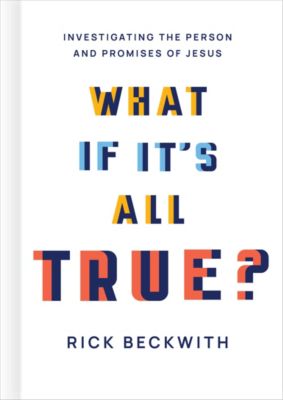
We must return to the basics of the faith and help others answer the question that informs every area of life: “Who is Jesus of Nazareth?”
By Jordan Wootten
Religious belief in America is a confusing and complicated picture. Many of our peers are seeking, yet secularizing; spiritual, yet irreligious; and eager to discover truth, yet unconvinced of Christianity’s truthfulness. Western society is as hungry for meaning as it’s ever been and frantically searching for it but skeptical that Jesus is the one who can satisfy that hunger.
How can we minister effectively in a culture as skeptical and disaffected as ours seems to be?
Life’s most important question
What would you say are life’s most important questions? Are they questions concerning who we should marry (or not), where we should live, or what career we should pursue? Or are they further beneath the surface: What is true? Where can we find meaning? How do we live according to what we believe to be true? Consciously or subconsciously, the way we answer deeper questions like these inevitably sets the trajectory of our lives.
In his book What If It’s All True?: Investigating the Person and Promises of Jesus, Rick Beckwith argues the most important question of all is the one Jesus asks His disciples in the Gospel of Matthew: “Who do you say that I am?” (Matthew 16:15b, CSB). At a time when many were confused about Jesus’s identity—“Some say John the Baptist; others, Elijah; still others, Jeremiah or one of the prophets” (Matthew 16:14, CSB)—His question confronted their conceptions of Him. Likewise, in our day, when many are dizzied by the menu of truth claims and value systems at our fingertips, Jesus confronts us with this most basic, most important question.
“When many are dizzied by the menu of truth claims and value systems at our fingertips, Jesus confronts us with the most basic, most important question.” — Jordan Wootten Click To TweetWhat do we do with Jesus?
“Who is Jesus of Nazareth?” is a question that “stands as foundational above all others,” Beckwith asserts. “Regardless of what anyone may personally believe about him,” Jaroslav Pelikan once wrote, “Jesus of Nazareth has been the dominant figure in the history of Western culture for almost 20 centuries.” His historical significance is indisputable. To that point, we can’t help but draw certain conclusions about Him.
For example, in Beckwith’s words, “Muslims believe Jesus was a wise prophet, Hindus believe He was an avatar, [and] modern Jews believe He was a great teacher.” Most atheists even acknowledge Jesus was a real person. It’s hard to argue that anyone “has impacted mankind more than Jesus of Nazareth.”
But merely recognizing Jesus’s “impact,” “significance,” and even “dominance” in Western culture does not sufficiently reckon with the magnitude of His life. We have to ask why He is so historically significant. And we can’t really answer that question unless we follow Beckwith’s advice and address for ourselves the question that “stands… above all others: Who is Jesus?”
In answer, Beckwith argues Jesus is the Christ, the “Son of Man,” God “in flesh,” the incarnate one. The truth is, if we and our neighbors want to find the meaning we’re all longing for, it’s not enough to affirm that Jesus is a historical person. And simply acknowledging He was a “wise prophet” or “great teacher” won’t deliver us from our confusion, nor will propping Him up as an “avatar” or our “homeboy.” We must “wager on” the incarnation, life, death, resurrection, and ascension of Jesus. In other words, to find meaning, as Beckwith argues, we must join the apostle Peter and confess that Jesus is “the Messiah, the Son of the living God” (Matthew 16:16b, CSB).
What if it’s true?
Confessing Jesus is the Christ is the beginning of the Christian life and the anchor of our faith. Believing Jesus is the Son of God helps us answer every other question Beckwith poses in the book including: What is your purpose? What is truth, and where do we find it? Where do we get clarity about God? Do painful experiences nullify what is true? These are some of the most instinctual, even guttural questions we ask ourselves—the ones we ask when we’re at the end of our rope and can’t make sense of things. And as Beckwith shows, Jesus delivers the answers we need.
“Confessing Jesus is the Christ is the beginning of the Christian life and the anchor of our faith.” — Jordan Wootten Click To TweetYet this whole exercise leads us to another important question: So what? What if it is true? What bearing does Jesus have on my life?
In a word, that Jesus is the Messiah—the one who died and rose from the dead—means everything about our lives changes. To “confess with [our] mouth, ‘Jesus is Lord,’ and believe in [our] heart that God raised him from the dead” means we “will be saved” (Romans 10:9, CSB). We are God’s children (1 John 3:1). And we’ve been “rescued from the domain of darkness and transferred into the kingdom of the Son” (Colossians 1:13, CSB). We’ve been blessed “with every spiritual blessing in the heavens” (Ephesians 1:3, CSB). And we’re “members of God’s household” (Ephesians 2:19, CSB). As for Beckwith’s other questions in the book, affirming Peter’s confession means life has meaning, we have a purpose, and God makes Himself known to us and present with us.
Life is full of complex and confounding questions each of us asks at some point. Until we recognize the foundational, basic truth that Jesus is the Messiah, truth, meaning, and purpose will elude us.
Back to the basics
The religious confusion of our moment is palpable. All around us, people are searching for faith, deconstructing their faith, or abandoning their faith altogether. And Western society is feeling the effects. To return to an earlier question, how can we be gospel ministers in an environment like this? How can we introduce or re-introduce our peers and neighbors to “the way, the truth, and the life” (John 14:6, CSB)? According to Beckwith, we should do so by posing and helping them answer the question that “informs every area of our life” and theirs: “Who is Jesus of Nazareth?” We need to return to the basics of the Christian faith.
“Until we recognize the foundational, basic truth that Jesus is the Messiah, truth, meaning, and purpose will elude us.” — Jordan Wootten Click To TweetIn the book of Matthew, Jesus’s question is not delivered to the unnamed crowds we encounter throughout the Gospels, but to His disciples. It was the ones who were closest to Him and who knew Him best who were confronted with this basic question. Similarly, it is a question we must answer clearly if we hope to minister effectively in our day.
So, let me ask you: Who do you say Jesus is? If you are not confident in your answer, Rick Beckwith’s book What If It’s All True is a helpful resource to lead you to revisit and reaffirm the basics of our faith.
For permission to republish this article, contact Marissa Postell Sullivan.













